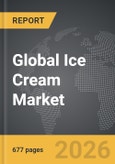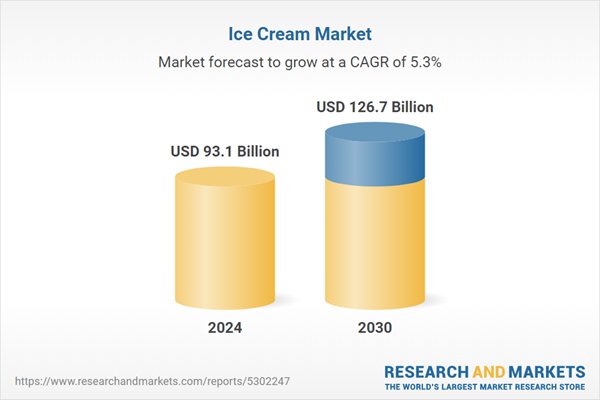Global Ice Cream Market - Key Trends and Drivers Summarized
Why Is Ice Cream Such a Perennial Favorite?
Ice cream has been a beloved treat across the world for centuries, yet its charm has persisted and even flourished in modern times. The origins of ice cream can be traced back to the ancient Chinese, Greek, and Roman civilizations, where flavored snow or iced concoctions were served to royalty and elites. Over the centuries, the dessert evolved, gradually incorporating dairy and sugar, which led to the creamy texture and sweet taste that defines modern ice cream. Its transition into a mainstream treat began in the 17th century when European chefs started adding flavors like vanilla and chocolate, and by the 19th century, the invention of mechanical refrigeration revolutionized production and distribution. This breakthrough made it possible to mass-produce ice cream, expanding its availability to a much broader audience. Today, the industry is marked by an explosion of flavors, from classic options like vanilla and strawberry to modern creations such as cookie dough, salted caramel, and exotic ingredients like ube or matcha. Ice cream is no longer just a frozen dessert - it is a versatile product that caters to diverse palates, offers a comforting treat, and even serves as a canvas for culinary creativity. Its place in popular culture is evident through numerous regional varieties, such as Italy's dense and flavorful gelato, Japan's mochi ice cream, and Thailand's rolled ice cream, each contributing to its status as a global icon.What Makes Ice Cream a Standout in the Food Industry?
The ice cream industry stands out in the global food market not only due to its rich history and widespread popularity but also because of its exceptional adaptability to changing consumer preferences and dietary trends. One of the most significant transformations in recent years has been the development and rapid expansion of non-dairy alternatives. As more consumers turn to plant-based diets and seek healthier options, brands have introduced innovative formulations using almond, oat, soy, and coconut milk bases, thereby attracting vegan consumers and those who are lactose intolerant. This diversification has turned ice cream into an inclusive product that appeals to nearly every dietary profile. Another trend that has redefined the category is the emergence of low-calorie, high-protein ice creams, exemplified by brands like Halo Top and Enlightened, which have gained immense popularity for their guilt-free indulgence. These products are made possible by advancements in food science, using sweeteners like stevia or erythritol and high-quality milk proteins to replicate the creamy, indulgent feel of traditional ice cream without the added calories. At the same time, premiumization is transforming the market as discerning consumers increasingly favor small-batch, artisanal brands that focus on quality ingredients, rich textures, and unique flavor pairings. From indulgent options like Häagen-Dazs to boutique makers that offer novel inclusions like lavender honey or balsamic fig, premium ice cream is tapping into the market for gourmet experiences.How Have Changing Consumer Preferences Shaped Ice Cream Trends?
Ice cream trends today are heavily influenced by evolving consumer behaviors and preferences. With health consciousness becoming a prominent driver, more consumers are seeking options that offer functional benefits, such as reduced sugar, added probiotics, or fortification with vitamins and minerals. This demand has encouraged brands to experiment with new ingredient combinations and formulations, resulting in products like keto-friendly ice creams and dairy-free versions fortified with pea protein. Alongside this, sustainability is gaining traction as a major concern for the modern consumer, leading many companies to adopt eco-friendly practices in both sourcing and packaging. Consumers are increasingly favoring brands that use organic and non-GMO ingredients, partner with local farmers, and employ sustainable production methods. Artisanal and small-batch ice creams are particularly popular, as they emphasize transparency, minimal processing, and a focus on authentic flavors. The preference for local and ethically sourced ingredients has also given rise to a resurgence of traditional ice cream parlors and creameries that emphasize handcrafted quality and community connection. Another emerging trend is the growing popularity of experiential ice cream, where the focus is on delivering a novel, multi-sensory experience rather than just a sweet treat. Innovative formats such as rolled ice cream, nitrogen-frozen desserts, and products infused with edible glitter or popping candy are not only expanding the range of offerings but also making ice cream a visually captivating, Instagram-worthy indulgence. Social media has become a powerful tool for shaping trends in this category, allowing brands to quickly reach younger consumers who value aesthetics and shareability as much as taste.What Factors are Propelling the Growth in the Ice Cream Market?
The growth in the ice cream market is driven by several factors, reflecting the convergence of technological advancements, shifting consumer behavior, and the evolution of distribution channels. Firstly, innovations in freezing technology have significantly extended the shelf life and quality of ice cream, enabling companies to distribute products over longer distances and enter new geographic markets. This technological leap has not only reduced wastage but also lowered costs, allowing for the broader availability of a wide range of products. Secondly, the rise of non-traditional flavors and the inclusion of functional ingredients have expanded the consumer base, catering to diverse dietary needs, including those of health-conscious individuals, vegans, and lactose-intolerant consumers. The demand for such specialized products is expected to grow further as health and wellness trends continue to influence purchasing decisions. Thirdly, digital transformation has played a pivotal role in reshaping how ice cream is marketed and consumed. E-commerce and direct-to-consumer (DTC) sales channels have seen a surge, as ice cream brands capitalize on the convenience of online shopping and the ability to deliver frozen goods with enhanced cold-chain logistics. Lastly, brand differentiation through unique flavor profiles, experiential offerings, and sustainability initiatives is also fueling market expansion. As consumers become more discerning, companies are leveraging social media platforms to create compelling narratives around their products, from highlighting ethical sourcing to showcasing inventive, visually appealing flavors. Consequently, the ice cream market is evolving beyond simple retail consumption to become an experiential and value-driven segment, attracting new demographics and fostering continued growth globally.Report Scope
The report analyzes the Ice Cream market, presented in terms of market value (US$ Thousand). The analysis covers the key segments and geographic regions outlined below.- Segments: Type (Take Home, Impulse, Artisanal); Flavor (Vanilla, Chocolate, Fruit, Other Flavors); Packaging Format (Cups & Tubs, Bars & Pops, Other Packaging Formats); Distribution Channel (Specialist Stores, Supermarkets & Hypermarkets, Convenience Stores, Other Distribution Channels).
- Geographic Regions/Countries:World; United States; Canada; Japan; China; Europe (France; Germany; Italy; United Kingdom; Spain; Russia; and Rest of Europe); Asia-Pacific (Australia; India; South Korea; and Rest of Asia-Pacific); Latin America (Argentina; Brazil; Mexico; and Rest of Latin America); Middle East (Iran; Israel; Saudi Arabia; United Arab Emirates; and Rest of Middle East); and Africa.
Key Insights:
- Market Growth: Understand the significant growth trajectory of the Take Home Ice Cream segment, which is expected to reach US$84.1 Billion by 2030 with a CAGR of a 5.6%. The Impulse Ice Cream segment is also set to grow at 4.9% CAGR over the analysis period.
- Regional Analysis: Gain insights into the U.S. market, valued at $24.4 Billion in 2024, and China, forecasted to grow at an impressive 8.1% CAGR to reach $28.2 Billion by 2030. Discover growth trends in other key regions, including Japan, Canada, Germany, and the Asia-Pacific.
Why You Should Buy This Report:
- Detailed Market Analysis: Access a thorough analysis of the Global Ice Cream Market, covering all major geographic regions and market segments.
- Competitive Insights: Get an overview of the competitive landscape, including the market presence of major players across different geographies.
- Future Trends and Drivers: Understand the key trends and drivers shaping the future of the Global Ice Cream Market.
- Actionable Insights: Benefit from actionable insights that can help you identify new revenue opportunities and make strategic business decisions.
Key Questions Answered:
- How is the Global Ice Cream Market expected to evolve by 2030?
- What are the main drivers and restraints affecting the market?
- Which market segments will grow the most over the forecast period?
- How will market shares for different regions and segments change by 2030?
- Who are the leading players in the market, and what are their prospects?
Report Features:
- Comprehensive Market Data: Independent analysis of annual sales and market forecasts in US$ Million from 2024 to 2030.
- In-Depth Regional Analysis: Detailed insights into key markets, including the U.S., China, Japan, Canada, Europe, Asia-Pacific, Latin America, Middle East, and Africa.
- Company Profiles: Coverage of players such as Blue Bell Creameries, General Mills Inc., Lotte Confectionery, Mars, Meiji Holdings Co. Ltd. and more.
- Complimentary Updates: Receive free report updates for one year to keep you informed of the latest market developments.
Some of the 242 companies featured in this Ice Cream market report include:
- Blue Bell Creameries
- General Mills Inc.
- Lotte Confectionery
- Mars
- Meiji Holdings Co. Ltd.
- Mihan Dairy Inc.
- Nestlé
- Turkey Hill
- Unilever Group Nestle S.A.
- Wells Dairy Inc.
This edition integrates the latest global trade and economic shifts into comprehensive market analysis. Key updates include:
- Tariff and Trade Impact: Insights into global tariff negotiations across 180+ countries, with analysis of supply chain turbulence, sourcing disruptions, and geographic realignment. Special focus on 2025 as a pivotal year for trade tensions, including updated perspectives on the Trump-era tariffs.
- Adjusted Forecasts and Analytics: Revised global and regional market forecasts through 2030, incorporating tariff effects, economic uncertainty, and structural changes in globalization. Includes historical analysis from 2015 to 2023.
- Strategic Market Dynamics: Evaluation of revised market prospects, regional outlooks, and key economic indicators such as population and urbanization trends.
- Innovation & Technology Trends: Latest developments in product and process innovation, emerging technologies, and key industry drivers shaping the competitive landscape.
- Competitive Intelligence: Updated global market share estimates for 2025, competitive positioning of major players (Strong/Active/Niche/Trivial), and refined focus on leading global brands and core players.
- Expert Insight & Commentary: Strategic analysis from economists, trade experts, and domain specialists to contextualize market shifts and identify emerging opportunities.
Table of Contents
Companies Mentioned (Partial List)
A selection of companies mentioned in this report includes, but is not limited to:
- Blue Bell Creameries
- General Mills Inc.
- Lotte Confectionery
- Mars
- Meiji Holdings Co. Ltd.
- Mihan Dairy Inc.
- Nestlé
- Turkey Hill
- Unilever Group Nestle S.A.
- Wells Dairy Inc.
Table Information
| Report Attribute | Details |
|---|---|
| No. of Pages | 677 |
| Published | February 2026 |
| Forecast Period | 2024 - 2030 |
| Estimated Market Value ( USD | $ 93.1 Billion |
| Forecasted Market Value ( USD | $ 126.7 Billion |
| Compound Annual Growth Rate | 5.3% |
| Regions Covered | Global |









